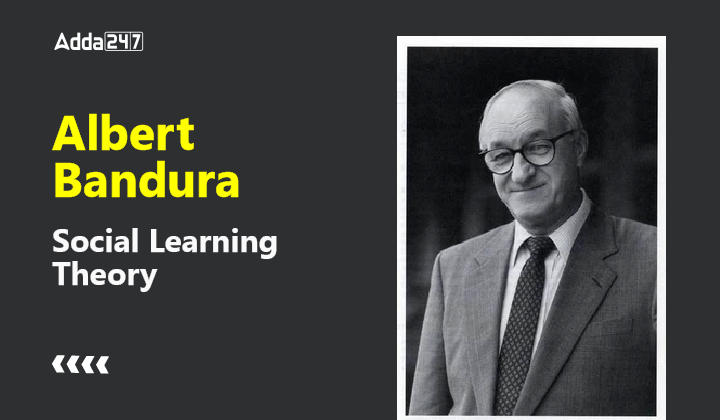Table of Contents
Albert Bandura’s Social Learning Theory holds a prominent place in child pedagogy. This theory emphasizes the role of observational learning and imitation in children’s development. Bandura proposed that children acquire new behaviors and skills by observing the actions and outcomes of others. This theory underscores the significance of positive role models and provides educators with insights into fostering constructive behaviors through modeling, guidance, and reinforcement. By understanding how children learn from their surroundings, educators can create enriched learning environments that encourage positive social interactions, self-regulation, and the cultivation of desirable traits in young learners.
Albert Bandura Social Learning Theory
Social learning theory focuses on the learning that occurs within a social context. It considers that people learn from one another, including such concepts as observational learning, imitation, and modeling. Among others Albert Bandura is considered the leading proponent of this theory.
General principles of social learning theory
- People can learn by observing the behavior is of others and the outcomes of those behaviors.
- Learning can occur without a change in behavior. Behaviorists say that learning has to be represented by a permanent change in behavior, in contrast social learning theorists say that because people can learn through observation alone, their learning may not necessarily be shown in their performance. Learning may or may not result in a behavior change
- Cognition plays a role in learning. Over the last 30 years social learning theory has become increasingly cognitive in its interpretation of human learning. Awareness and expectations of future reinforcements or punishments can have a major effect on the behaviors that people exhibit.
- Social learning theory can be considered a bridge or a transition between behaviorist learning theories and cognitive learning theories.
Contemporary social learning perspective of reinforcement and punishment
- Contemporary theory proposes that both reinforcement and punishment have indirect effects on learning. They are not the sole or main cause.
- Reinforcement and punishment influence the extent to which an individual exhibits a behavior that has been learned.
- The expectation of reinforcement influences cognitive processes that promote learning. Therefore attention pays a critical role in learning. And attention is influenced by the expectation of reinforcement. An example would be, where the teacher tells a group of students that what they will study next is not on the test. Students will not pay attention, because they do not expect to know the information for a test.
Educational implications of social learning theory
- Students often learn a great deal simply by observing other people.
- Describing the consequences of behavior is can effectively increase the appropriate behaviors and decrease inappropriate ones. This can involve discussing with learners about the rewards and consequence of various behaviors.
- Modeling provides an alternative to shaping for teaching new behaviors. Instead of using shaping, which is operant conditioning modeling can provide a faster, more efficient means for teaching new behavior. To promote effective modeling a teacher must make sure that the four essential conditions exist; attention, retention, motor reproduction, and motivation.
- Teachers and parents must model appropriate behaviors and take care that they do not model inappropriate behaviors.
- Teachers should expose students to a variety of other models. This technique is especially important to break down traditional stereotypes.
- Students must believe that they are capable of accomplishing school tasks. Thus it is very important to develop a sense of self efficacy for students. Teacher scan promote such self-efficacy by having students receive confidence-building messages watch others be successful and experience success on their own.
- Teachers should help students set realistic expectations for their academic accomplishments. In general in my class that means making sure that expectations are not set too low. I want to realistically challenge my students. However, sometimes the task is beyond a student’s ability, example would be the cancer group.
- Self-regulation techniques provide an effective method for improving student behavior.
Observational Learning
Observational learning, also called social learning theory, occurs when an observer’s behavior changes after viewing the behavior of a model. An observer’s behavior can be affected by the positive or negative consequences-called vicarious reinforcement or vicarious punishment- of a model’s behavior.
Learning by observation involves four separate processes:
- Attention: Observer scan not learn unless they pay attention to what’s happening around them. This process is influenced by characteristics of the model, such as how much one likes or identifies with the model, and by characteristics of the observer, such as the observer’s expectations or level of emotional arousal.
- Retention: Observers must not only recognize the observed behavior but also remember it at some later time. This process depends on the observer’s ability to code or structure the information in an easily remembered form or to mentally or physically rehearse the model’s actions.
- Production: Observers must be physically and/intellectually capable of producing the act. In many cases the observer possesses the necessary responses but sometimes reproducing the model’s actions may involve skills the observer has not yet acquired. It is one thing to carefully watch a circus juggler, but it is quite another to go home and repeat those acts.
- Motivation: In general, observers will perform the act only if they have some motivation or reason to do so. The presence of reinforcement or punishment, either to the model or directly to the observer, becomes most important in this process.
Download Albert Bandura Social Learning Theory Study Notes PDF



 RRB Railway Teacher Exam Date 2025, Exam...
RRB Railway Teacher Exam Date 2025, Exam...
 AIIMS Faculty Recruitment 2025 Notificat...
AIIMS Faculty Recruitment 2025 Notificat...
 CSIR NET Chemical Science Cut Off Marks,...
CSIR NET Chemical Science Cut Off Marks,...














